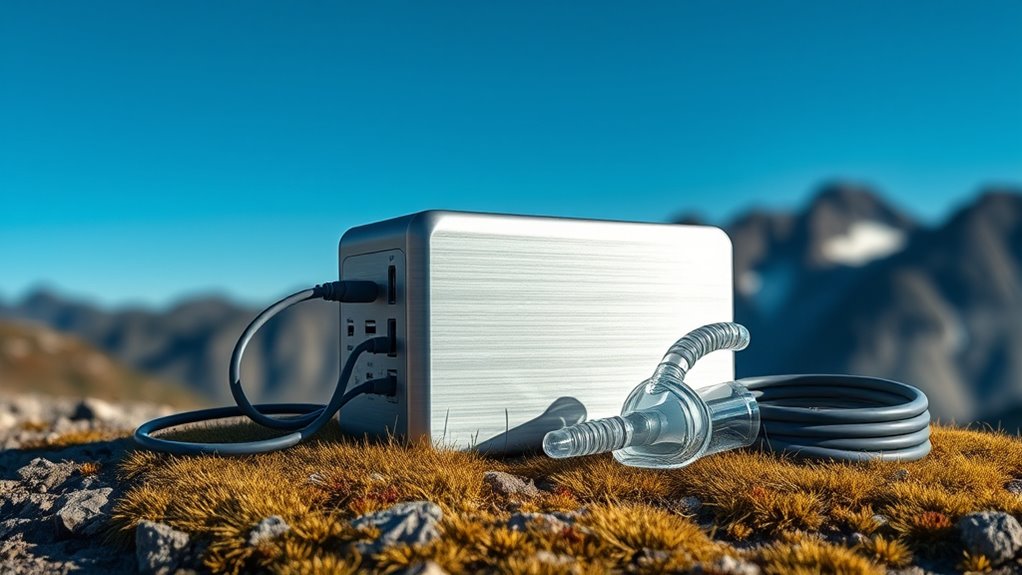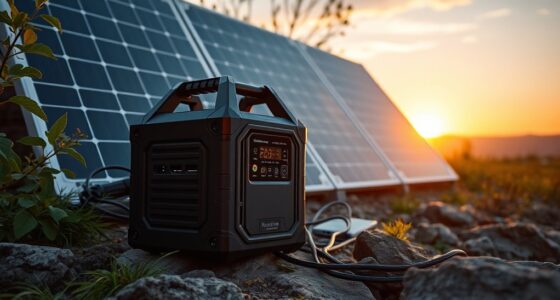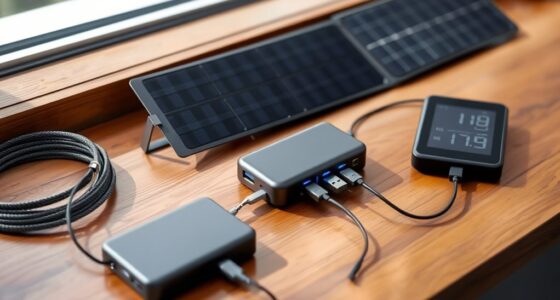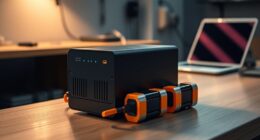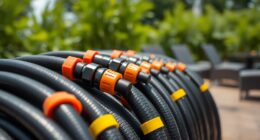When choosing portable power stations for CPAP machines, I look for models with around 150-300Wh capacity, multiple outlets, and pure sine wave AC to guarantee safe, stable power. Units like the Jackery Explorer 300 and PROGENY 300W are compact and dependable, perfect for travel or emergencies. Some feature solar recharging for convenience. If you want reliable options tailored for CPAP use, keep exploring which ones fit your needs best.
Key Takeaways
- Look for power stations with at least 100Wh capacity and pure sine wave inverters for safe CPAP operation.
- Ensure the unit supports continuous output of 250W-300W and has multiple charging options for flexibility.
- Choose models with BMS protection and reliable battery chemistry like LiFePO4 for safety and longevity.
- Prioritize lightweight, portable units with multiple outlets and pass-through charging for overnight use.
- Opt for units with solar recharging capability to maintain power during extended outdoor or emergency scenarios.
Jackery Portable Power Station Explorer 300
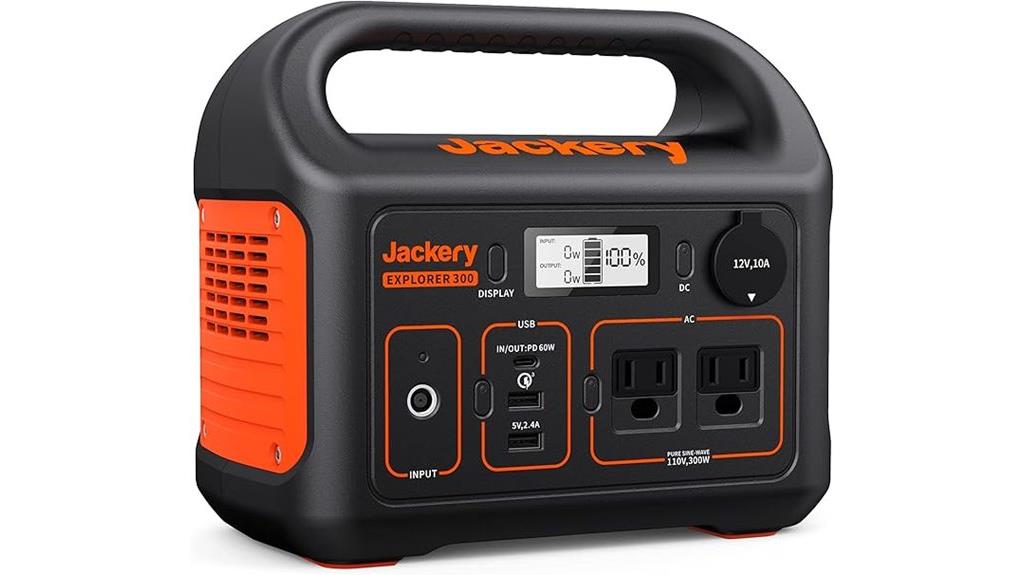
Looking for a lightweight, reliable power source to keep your CPAP machine running during outdoor adventures or power outages? The Jackery Explorer 300 is a perfect choice. Weighing just 7.1 pounds, it’s portable and easy to carry. It features a 293Wh lithium-ion battery and multiple outlets, including two AC ports, USB-C, USB-A, and a car socket, so you can power several devices at once. Its pure sine wave AC output guarantees safe, stable power for sensitive electronics like your CPAP. Recharge it quickly via wall, car, or solar, making it versatile for camping, emergencies, or travel. It’s a dependable, compact power station you can trust.
Best For: individuals seeking a lightweight, portable power solution to reliably power sensitive electronics like CPAP machines during outdoor trips, camping, or emergency situations.
Pros:
- Compact and lightweight design (only 7.1 pounds), making it highly portable
- Multiple output options including AC, USB-C, USB-A, and car socket for versatile device charging
- Pure sine wave AC outlet ensures safe, stable power suitable for sensitive electronics
Cons:
- Takes approximately 4 hours to fully recharge with solar, which may be slow in some conditions
- Cannot support high-demand appliances such as induction cooktops or blenders
- High-power devices like tire inflators cannot operate at high charge levels (>50%)
PROGENY 300W Portable Power Station
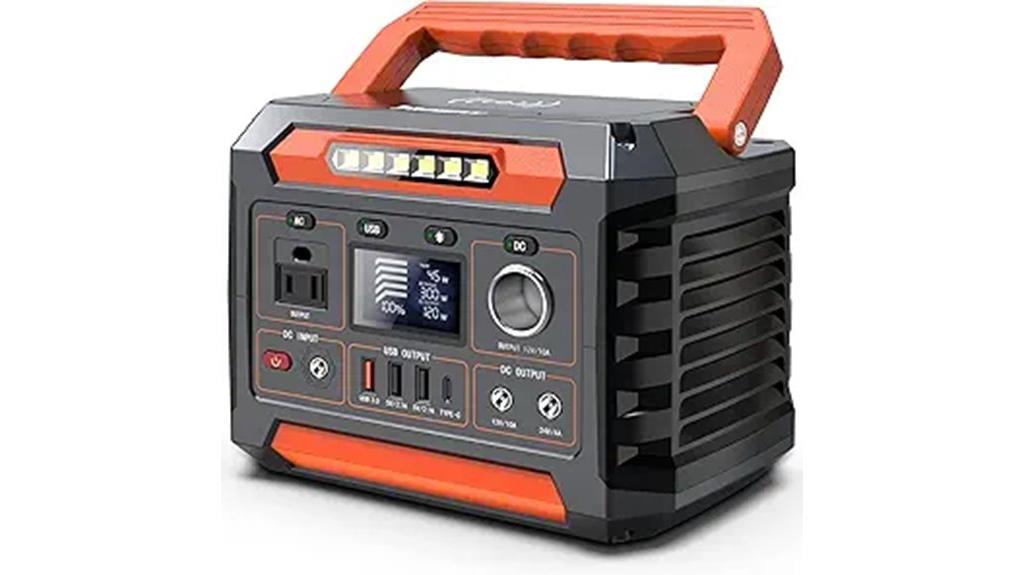
The PROGENY 300W Portable Power Station is an excellent choice for CPAP users who need reliable, portable power during travel or emergencies. With a 299Wh capacity and weighing only 7 pounds, it’s easy to carry and versatile enough to power CPAP devices for 2-4 nights. It features multiple outputs, including a pure sine wave AC outlet, USB-C, and regulated 12V, ensuring safe operation of sensitive equipment. Recharging is quick via solar, AC, or car, thanks to MPPT technology. Built-in safety features and pass-through charging make it dependable and convenient, whether you’re camping, at home, or on the road.
Best For: travelers, campers, and emergency preparedness individuals who need reliable, portable power to run small appliances, electronics, or CPAP devices during outdoor activities or power outages.
Pros:
- Lightweight and portable at only 7 pounds, easy to carry on the go.
- Multiple output options including pure sine wave AC, USB-C, and regulated 12V for safe operation of sensitive devices.
- Fast recharging via solar, AC, or car with MPPT technology, reducing charging time significantly.
Cons:
- Battery level indicator displayed in 20% increments, which may be less precise for some users.
- Rated at 300W with a peak of 600W, potentially limiting the use of higher-power devices.
- Slightly higher price point compared to similar portable power stations with fewer features.
Portable Power Station 300W (Peak 600W) with Solar Generator
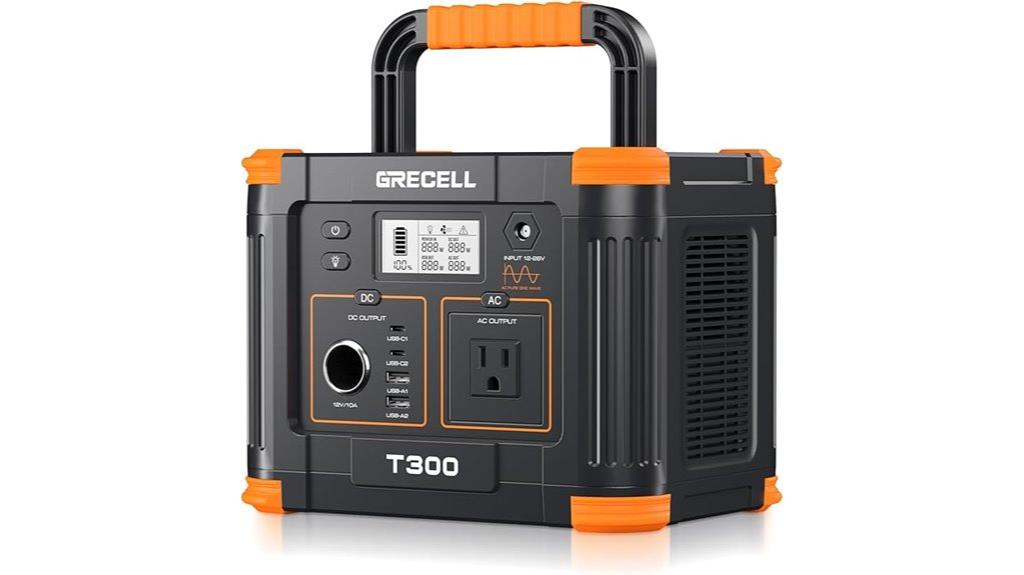
If you need a reliable power source for your CPAP machine during outages or outdoor adventures, the GRECELL Portable Power Station 300W (Peak 600W) is an excellent option. It offers 230.88Wh capacity with a 300W continuous (600W peak) pure sine wave AC output, supporting devices like CPAP machines, phones, and lights. Weighing just 7.3 pounds, it’s compact and portable. It features multiple outlets, including AC, USB-C PD, and USB-A ports, supporting fast charging. Recharge options include AC, solar via MPPT, and car outlets, making it versatile. Its durable design and quiet cooling fans ensure safe, reliable operation for outdoor use and emergency backup.
Best For: outdoor enthusiasts, campers, and emergency preparedness users who need a compact, reliable power source for small appliances, devices, and medical equipment like CPAP machines.
Pros:
- Lightweight and portable at only 7.3 pounds, easy to carry for outdoor activities or travel.
- Supports multiple devices simultaneously with fast-charging USB-C PD ports and a standard AC outlet.
- Recharges quickly via AC, solar, or car outlet, with built-in MPPT for efficient solar energy capture.
Cons:
- Limited capacity of 230.88Wh may not support larger appliances or extended power needs.
- AC and car ports are located on the sides, which may require modifications for easier access in certain setups.
- The maximum continuous output of 300W might be insufficient for high-power devices or longer use of heavy loads.
Jackery Explorer 1000 v2 Portable Power Station

For those seeking a reliable portable power source to keep their CPAP machines running during outages or outdoor adventures, the Jackery Explorer 1000 v2 stands out with its impressive 1,070Wh lithium iron phosphate (LiFePO4) battery. It delivers a 1,500W AC output and a surge capacity of 3,000W, powering multiple appliances like CPAPs, small fridges, or electric pots. Weighing just 23.8 pounds with a foldable handle, it’s easy to carry. Quick to charge—just 1.7 hours via standard AC or one hour in emergency mode—it’s designed for durability, offering over 4,000 cycles and a lifespan exceeding 10 years.
Best For: individuals seeking a reliable, portable power solution for outdoor adventures, emergency backup, or powering sensitive devices like CPAP machines.
Pros:
- High-capacity 1,070Wh LiFePO4 battery with over 4,000 charge cycles for long-term use
- Fast charging capabilities: 1 hour in emergency mode and 1.7 hours via standard AC power
- Multiple outputs including USB-C PD 100W, AC outlets, and DC car port for versatile device charging
Cons:
- Only compatible with Jackery solar panels for solar recharging, limiting flexible solar options
- Delivery restricted to PO boxes, which may be inconvenient for some users
- Heavier than some portable power stations at 23.8 pounds, despite its compact design
Portable Power Station 300W MARBERO Camping Solar Generator (CPAP Backup Lithium Battery)
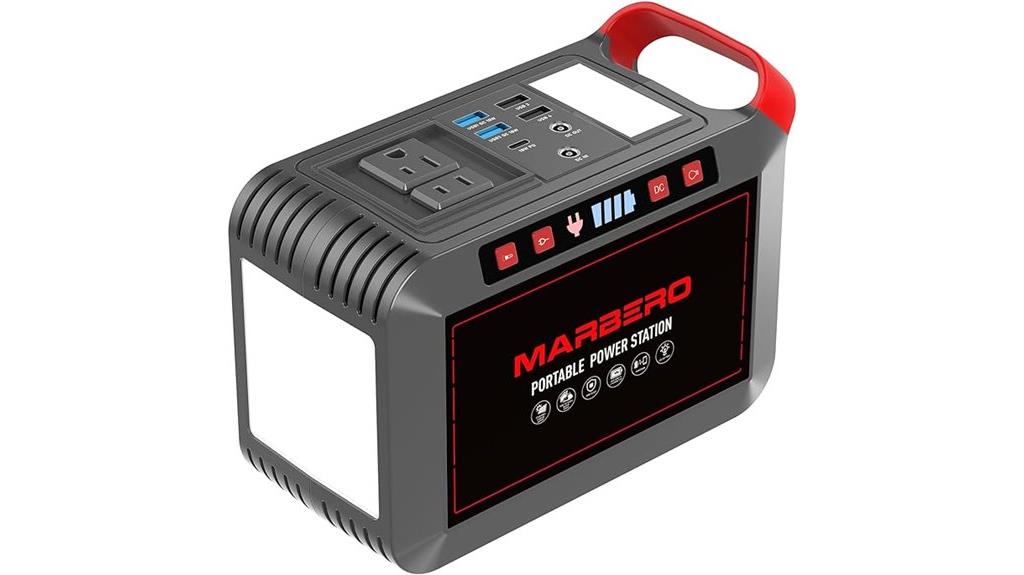
When I need a reliable backup power source for my CPAP machine during outdoor trips or power outages, the 300W MARBERO Camping Solar Generator stands out. Its compact size and lightweight design (just 4.6 pounds) make it easy to carry anywhere. With multiple outlets—including AC, USB, and USB-C—it can power my CPAP, phone, and other devices simultaneously. The built-in LED lanterns are a bonus for outdoor use. Charging options include wall, car, or solar (panel sold separately), ensuring flexibility. The advanced BMS guarantees safety, and the device automatically shuts down during overloads. It’s a dependable, portable power solution for any emergency or adventure.
Best For: outdoor enthusiasts, emergency preparedness, and travelers needing reliable portable power for CPAP machines and electronic devices.
Pros:
- Compact, lightweight design (4.6 lbs) for easy portability.
- Multiple charging options including wall, car, and solar (panel sold separately).
- Built-in LED lanterns with adjustable brightness and modes for outdoor use.
Cons:
- Solar panel not included, requiring an additional purchase for solar recharging.
- 300W power output may limit use with high-wattage appliances.
- Charging time from wall outlet (6 hours) may be longer for some users.
Solar Generator 300W Portable Power Station with Solar Panel

The Solar Generator 300W Portable Power Station with Solar Panel stands out as an ideal choice for outdoor enthusiasts and emergency preparedness, especially those relying on CPAP machines. Its 250Wh lithium-ion battery can power small devices like smartphones, tablets, and laptops, making it versatile for camping or emergencies. The foldable 40W solar panel offers high efficiency and portability, ensuring quick recharging even in low light. With multiple outlets, USB ports, and a built-in LED flashlight, it’s designed for convenience and safety. Its compact size and smart protection features make it a reliable, lightweight option to keep your CPAP machine running wherever you go.
Best For: outdoor enthusiasts, campers, and emergency preparedness individuals who need a reliable, portable power source for small devices and CPAP machines.
Pros:
- Compact, lightweight, and portable design makes it easy to carry during outdoor activities or travel
- High efficiency foldable solar panel ensures quick recharging even in low-light conditions
- Multiple outlets and USB ports provide versatile charging options for various devices
Cons:
- Limited to 250Wh capacity, may not power larger or high-wattage appliances for extended periods
- Devices over 250W or with heat-prone components could damage the generator
- The solar panel’s 40W output may be slow to fully recharge the power station in overcast conditions
Portable Power Station with 40800mAh Capacity and Multiple Outlets
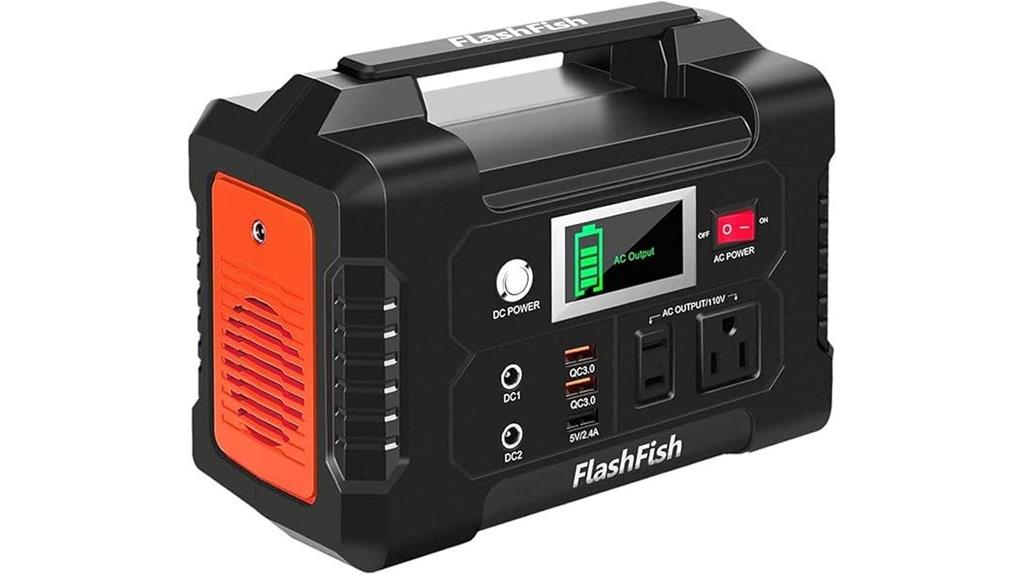
A portable power station with a 40800mAh capacity and multiple outlets offers a reliable backup for CPAP users, especially during outdoor trips or power outages. The FlashFish 200W model is compact and lightweight, weighing just over 4 pounds with a durable exterior and soft handle for easy transport. It features various outlets, including AC, USB, and DC ports, allowing you to power your CPAP machine along with other devices. While its advertised capacity is 151Wh, real-world tests show it can comfortably run small electronics for hours. Its multiple charging options—AC, car, and solar—make it versatile, ensuring you stay powered wherever you go.
Best For: outdoor enthusiasts, campers, and emergency preparedness individuals seeking a portable, reliable power source for small electronics and CPAP machines.
Pros:
- Lightweight and compact design weighing just over 4 pounds for easy portability
- Multiple outlets including AC, USB, and DC ports to power various devices simultaneously
- Versatile charging options (AC, car, solar) for use in different environments
Cons:
- Advertised capacity of 151Wh may be inflated; real-world tests show around 50Wh capacity
- Cannot power larger appliances like refrigerators or hotplates
- Limited to about 200W maximum output, not suitable for high-wattage devices
ALLWEI Portable Power Station 300W
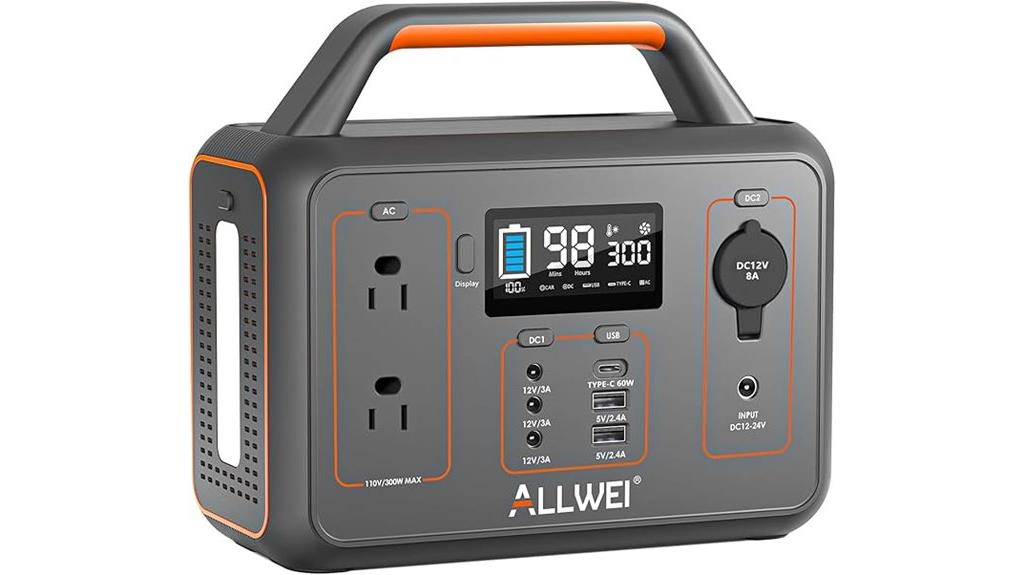
If you’re looking for a reliable power source to keep your CPAP machine running during outdoor trips or emergencies, the ALLWEI Portable Power Station 300W stands out with its compact size and versatile charging options. Weighing just 6.5 pounds, it features a 280Wh capacity, pure sine wave AC outlets, multiple USB and DC ports, and an integrated LED SOS light. It supports recharging via AC, car, or solar panel, making it flexible for various scenarios. With a durable build, quiet operation, and ability to power devices up to 300W, it’s a dependable choice for portable, emergency, and outdoor use.
Best For: outdoor enthusiasts, emergency preparedness individuals, and travelers needing a compact, reliable power source for devices like CPAP machines, phones, and laptops.
Pros:
- Lightweight and portable at only 6.5 pounds, easy to carry during outdoor activities or emergencies
- Multiple recharging options including AC, car, and solar, offering flexibility in various scenarios
- Pure sine wave AC outlets and high-capacity USB ports ensure safe and efficient device charging
Cons:
- Limited 300W power capacity may not support high-wattage appliances or multiple heavy-duty devices simultaneously
- Solar panel sold separately, requiring additional purchase for solar recharging functionality
- Battery life cycle of around 1500 cycles may lead to eventual capacity reduction over long-term use
Portable Power Station 300W, 296Wh Solar Generator

For anyone needing reliable backup power for their CPAP machine during travel or outages, the Portable Power Station 300W, 296Wh Solar Generator offers an excellent solution. It features a 296Wh battery with a pure sine wave AC outlet, providing 300W continuous power and supporting up to 600W. Its compact, lightweight design (just 7.1 pounds) makes it perfect for outdoor use, with a built-in handle and detachable strap. It supports solar panel charging, enhancing versatility. Safety is a priority with BMS protection, and it powers multiple devices simultaneously through various ports, including USB-C, USB-A, and AC outlets, ensuring my essentials stay powered anywhere I go.
Best For: individuals seeking reliable, portable backup power for travel, outdoor adventures, or emergency situations, especially those using CPAP machines.
Pros:
- Lightweight and compact at only 7.1 pounds, easy to carry with built-in handle and detachable strap
- Supports multiple devices simultaneously with various ports, including USB-C PD and AC outlets
- Safe and durable with BMS protection and cooling vents to prevent overheating
Cons:
- Limited to 300W continuous power, may not support high-wattage appliances
- Battery capacity of 296Wh might require frequent recharging during extended use
- Charging options depend on solar or AC sources, which may not be always available in remote areas
GRECELL Portable Power Station 300W
https://m.media-amazon.com/images/I/71cEx01+hNL._AC_SX679_.jpg
The GRECELL Portable Power Station 300W is an excellent choice for those needing a reliable backup power source for CPAP machines during outages or outdoor adventures. Its 230Wh LiFePO4 battery supports 300W continuous output, enough to run CPAP devices and multiple other gadgets simultaneously. With versatile recharging options—AC, solar, car, or Type-C—it’s quick to recharge and ready when you need it. The station’s safety features, including overload and short-circuit protection, ensure peace of mind. Compact and lightweight, it’s perfect for camping, RV trips, or emergency use, providing dependable power wherever you go.
Best For: outdoor enthusiasts, campers, RV travelers, and emergency preparedness users needing reliable portable power for small appliances and devices like CPAP machines.
Pros:
- Supports multiple recharging options including AC, solar, car, and Type-C, offering great flexibility.
- Equipped with safety features such as overload, overcharge, and short-circuit protection for peace of mind.
- Compact and lightweight design makes it highly portable for outdoor and emergency use.
Cons:
- Limited 230Wh capacity may not power larger appliances or longer-term needs.
- Does not include a solar panel, requiring an additional purchase for solar charging.
- Power output is limited to devices under 300W, restricting use with higher-wattage equipment.
Portable Power Station, 300W (600W Peak) 299Wh LiFePO4 Solar Generator

This 300W (600W peak) LiFePO4 solar generator stands out as an ideal power solution for CPAP users seeking reliable, portable backup power. Weighing just 6.8 pounds, it’s compact, durable, and packed with features like pure sine wave outlets, PD USB ports, and multiple charging options—AC, solar, or car. Its 299Wh capacity and stable LiFePO4 batteries ensure safe, long-lasting use over 2000 cycles. Designed for outdoor, emergency, or home use, it provides dependable power for sensitive devices like CPAP machines. The built-in flashlight and versatile ports make it a practical, lightweight choice for staying powered anywhere.
Best For: users seeking a portable, reliable backup power solution for camping, emergency use, or powering sensitive devices like CPAP machines.
Pros:
- Compact and lightweight design weighing only 6.8 pounds for easy portability
- Safe and durable LiFePO4 batteries with over 2000 recharge cycles and built-in safety protections
- Multiple charging options including AC, solar, and car, with versatile output ports for various devices
Cons:
- Charging time can be lengthy (up to 8 hours) depending on the method used
- Some units may display false battery levels or experience shutdown issues after storage
- Limited to 299Wh capacity, which may not be sufficient for high-power devices for extended periods
Portable Power Station 300W with Solar Generator and AC Outlet

A 300W portable power station with a solar generator and AC outlet is an ideal choice for anyone needing reliable, on-the-go power for CPAP machines, especially during outdoor adventures or emergencies. With a 228Wh capacity, it supports devices under 300W, including CPAPs, phones, lights, and small appliances. It features multiple ports—USB, AC, DC, and wireless charging—making it versatile. Charging options include solar, car, or wall outlet, taking roughly 6-8 hours. Its compact, lightweight design guarantees easy portability, while safety features like BMS protect your devices. This power station delivers dependable backup power wherever you need it most.
Best For: outdoor enthusiasts, campers, and emergency preparedness individuals needing reliable portable power for small devices like CPAP machines, phones, and lights.
Pros:
- Supports multiple devices simultaneously including USB, AC, DC, and wireless charging.
- Compact and lightweight design for easy portability during outdoor activities or travel.
- Efficient solar charging with built-in MPPT controller ensures faster recharging from solar panels.
Cons:
- Limited to devices under 300W, restricting use with larger appliances.
- Solar charging time (6-7 hours) may be lengthy depending on sunlight conditions.
- Battery capacity (228Wh) may not suffice for extended power needs in high-demand scenarios.
Takki Portable Power Station 111Wh Camping Solar Generator
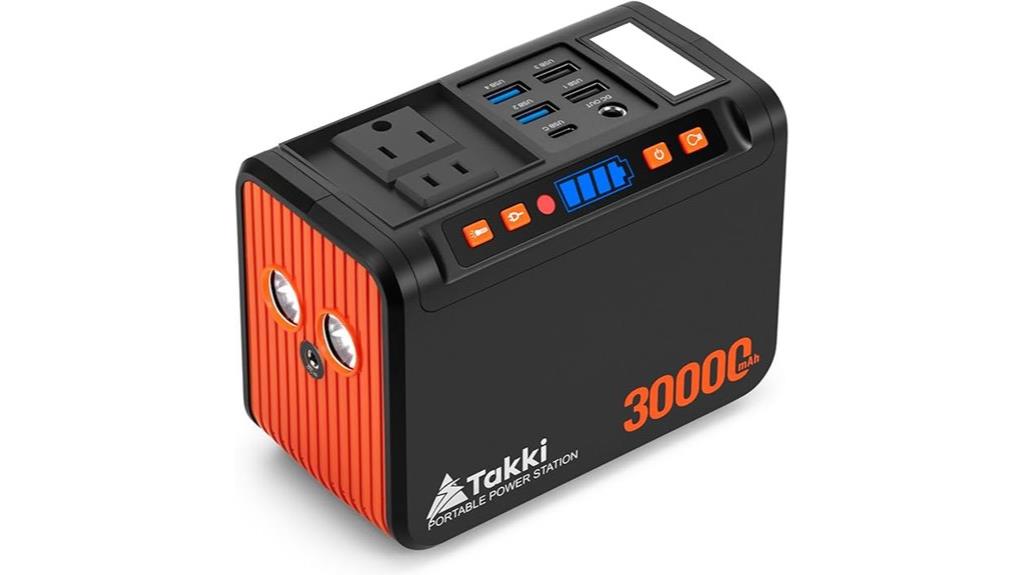
For anyone needing a compact, reliable power source for their CPAP machine during camping or emergencies, the Takki Portable Power Station 111Wh stands out. Weighing just 2.3 pounds and measuring 5.7 x 4.13 x 3 inches, it’s highly portable. It offers eight output ports, including an AC socket, USB, Type-C, and DC, capable of powering devices up to 80W. With a 111Wh capacity and built-in MPPT controller, it charges via AC or solar panels, making it versatile for outdoor use. The device features a flashlight and safeguards against overcharge and overheating. It’s ideal for small devices, but some users report performance issues, so check reviews before buying.
Best For: campers, emergency preparedness users, and anyone needing a portable power source for small devices like CPAP machines during outdoor activities or power outages.
Pros:
- Compact and lightweight design (2.3 pounds, 5.7 x 4.13 x 3 inches) for easy portability
- Multiple output ports including AC, USB, Type-C, and DC to power a variety of small devices
- Supports solar charging with built-in MPPT controller, making it versatile for outdoor use
Cons:
- Limited to devices up to 80W; cannot power larger appliances like refrigerators or high-wattage tools
- Some users report performance issues such as rapid battery drain and inability to sustain device power
- Indicator lights may be hard to see outdoors, affecting usability in low-light conditions
Takki Portable Power Station 277Wh
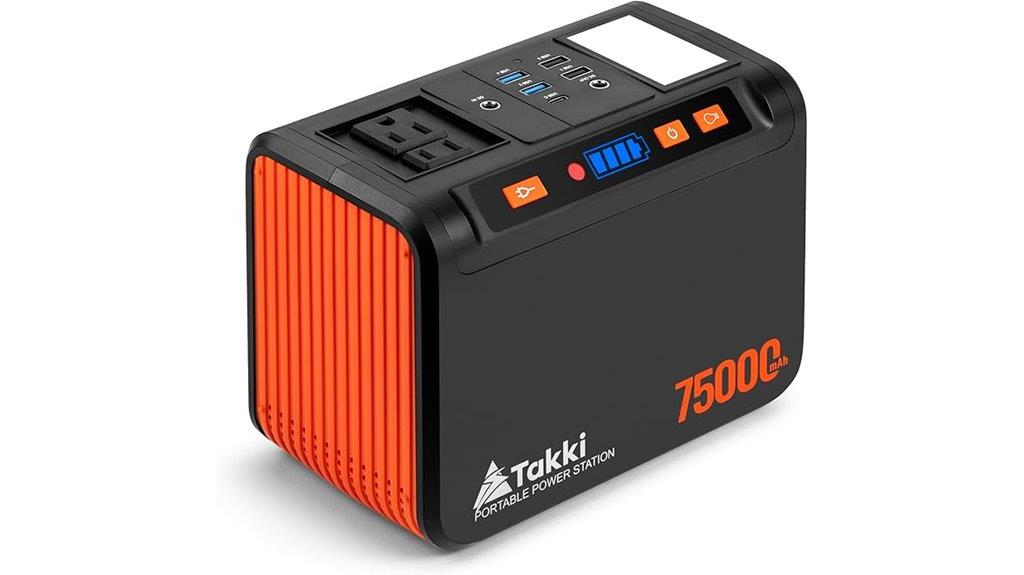
The Takki Portable Power Station 277Wh stands out as an excellent choice for CPAP users who need reliable, portable power during outages or outdoor trips. Its compact size and lightweight design (just under 6 pounds) make it easy to carry anywhere. With a 277Wh capacity, it can support devices up to 250W continuously, perfect for running a CPAP machine overnight. The station features a pure sine wave outlet for safe, stable power, along with multiple ports including USB, Type-C, and DC. Recharging is flexible via AC, car, or solar, ensuring you stay powered in any situation. Plus, the built-in LED lantern adds extra convenience outdoors.
Best For: CPAP users, campers, and emergency preparedness individuals seeking a reliable, portable power source to run devices up to 250W with flexible recharging options.
Pros:
- Compact and lightweight design for easy portability and outdoor use
- Pure sine wave outlet ensures safe, stable power for sensitive devices like CPAP machines
- Multiple charging options including AC, car, and solar compatibility for versatile power access
Cons:
- Limited to 250W continuous power, which may not support higher-wattage devices
- Solar panels are not included, requiring additional purchase for solar recharging
- Recharging times can be lengthy depending on the power source and method used
Factors to Consider When Choosing a Portable Power Station for CPAP

When choosing a portable power station for your CPAP, I consider factors like battery capacity to guarantee it lasts through the night and compatibility with your device’s ports. I also look at power output stability for consistent performance, along with recharging options that fit my travel needs. Finally, I keep size and portability in mind so it’s easy to carry without sacrificing power.
Battery Capacity Needs
Choosing the right battery capacity for your CPAP portable power station depends on your device’s power consumption and how long you plan to use it. Most CPAP machines use around 30-60W, so calculating your needs involves multiplying wattage by hours of use. To run a CPAP through an entire night, aim for a capacity of at least 150Wh to 300Wh, providing 8-12 hours of operation. Larger capacities, like 300Wh or more, offer extended backup but can be heavier and bulkier. It’s important to verify your CPAP’s wattage first and then select a power station with a capacity exceeding your calculated needs to account for efficiency losses and future flexibility. This way, you ensure reliable power without overburdening your setup.
Port Compatibility Options
Selecting the right port options on a portable power station is crucial for ensuring your CPAP machine operates smoothly and reliably. I look for a dedicated 12V DC car port or a regulated 12V output, which provides stable power essential for consistent operation. Multiple AC outlets with pure sine wave technology are a must, as they deliver clean, stable power that sensitive CPAP devices need. USB-C PD ports with at least 18W are also important for fast charging accessories or backup batteries. I verify that the power station’s voltage matches my CPAP’s requirements, typically 12V or 24V, and that it supports pass-through charging for uninterrupted use. Finally, built-in safety features like BMS protection, overvoltage, and overload safeguards protect my equipment during power fluctuations.
Power Output Stability
Ensuring your CPAP machine runs smoothly depends heavily on how stable the power output from your portable station is. Unstable power can cause interruptions, error messages, or shutdowns, jeopardizing your sleep quality and health. A pure sine wave inverter is essential because it provides smooth, reliable current similar to household power, reducing the risk of damage to sensitive CPAP devices. Voltage fluctuations can lead to inconsistent airflow or therapy settings, so a power station with regulated outlets helps maintain a steady voltage level. Additionally, features like real-time output displays allow you to monitor power stability, giving peace of mind that your device receives a consistent supply. Prioritizing stability ensures uninterrupted therapy and optimal performance during your travels.
Recharging Methods Available
When evaluating portable power stations for CPAP use, it’s important to contemplate the variety of recharging methods they support. I look for units that offer multiple options like AC wall outlets, car adapters, and solar panels, ensuring flexibility during travel or outdoor activities. I also check if the device uses MPPT technology, which boosts solar charging efficiency and reduces recharge times. Knowing how long each method takes is vital—some units fully recharge via AC in about 2-4 hours, while solar charging can take 6-8 hours depending on sunlight. Additionally, I prefer power stations that support pass-through charging, allowing my CPAP to run continuously while recharging. Finally, I verify compatibility with my available power sources and whether I need extra accessories like solar panels.
Portability and Size
Portability and size are essential factors when choosing a portable power station for your CPAP, especially if you plan to travel or camp frequently. I look for units under 10 pounds to guarantee easy carrying without strain. Checking dimensions is critical—I want a compact design that fits comfortably in my backpack or carry case. A built-in handle helps with quick setup and one-handed transport. I also consider the battery capacity relative to my CPAP’s power needs, aiming for enough runtime without excessive bulk. Using lightweight, durable materials like ABS or polycarbonate helps keep the station manageable while withstanding travel conditions. Ultimately, choosing a portable power station that balances size, weight, and capacity makes my travels more comfortable and hassle-free.
Safety and Battery Life
Choosing a portable power station with strong safety features and long battery life is vital for reliable CPAP use on the go. I look for units with high-capacity batteries like LiFePO4, which can handle over 2000 charge cycles, guaranteeing durability and safety over time. A built-in Battery Management System (BMS) is essential; it protects against overvoltage, overcurrent, overheating, and short circuits, safeguarding both the device and my CPAP machine. I also prioritize models that deliver a pure sine wave output, providing stable, clean power that prevents damage to sensitive equipment. Cold weather can impact performance, so I choose units with temperature regulation features. Finally, I make a habit of recharging before dropping below 20% to maintain battery health and ensure reliable operation whenever I need it.
Frequently Asked Questions
How Long Can a Portable Power Station Reliably Run a CPAP Machine?
You’re wondering how long a portable power station can reliably run a CPAP machine. It depends on the station’s capacity and your CPAP’s power consumption. Typically, a good station with around 600-1000Wh can power a CPAP for 1-2 nights, or roughly 8-12 hours daily. I recommend checking your CPAP’s wattage and matching it with the power station’s specs for accurate estimates.
Are Portable Power Stations Compatible With All CPAP Models?
Oh, sure, portable power stations are compatible with *all* CPAP models—if you ignore the pesky details like voltage and connector types. In reality, I’ve found that not all stations fit every device. You really need to check the specs and connectors first. It’s like trying to fit a square peg in a round hole; a little research saves you a lot of frustration later.
What Maintenance Is Required for Portable Power Stations Used With CPAPS?
Maintenance for portable power stations used with CPAPs is straightforward. I regularly keep the device clean and check the connections to make certain they’re secure. I also monitor the battery health by charging it fully and avoiding over-discharge. Every few months, I review the user manual for specific care tips. Keeping the station in a cool, dry place helps extend its lifespan, so I make sure to store it properly.
Can Portable Power Stations Be Recharged With Solar Panels During Use?
Yes, portable power stations can be recharged with solar panels during use. I’ve found that many models are compatible with solar panels, allowing me to harness sunlight and keep my devices powered without needing traditional outlets. It’s especially useful when I’m off-grid for extended periods. Just make sure your power station supports solar charging and use compatible panels for efficient recharging. It’s a great way to stay connected anywhere.
What Safety Features Should I Look for in a Portable Power Station for CPAP Use?
When choosing a portable power station for my CPAP, I look for safety features like surge protection to prevent overloads, short-circuit protection for my device’s safety, and overcharge protection to avoid battery damage. Also, I prefer stations with temperature control and automatic shutoff. These features give me peace of mind, ensuring my CPAP runs smoothly and safely, even during extended use or in unfamiliar environments.
Conclusion
Just like a lighthouse guides ships through stormy nights, choosing the right portable power station ensures your CPAP stays powered no matter where adventure takes you. With the right choice, you’ll navigate your travels smoothly, avoiding unexpected darkness. Remember, it’s about finding that reliable beacon in your journey—so you wake up refreshed and ready, no matter how wild the seas or quiet the dawn. Your perfect power companion is waiting to light your way.
